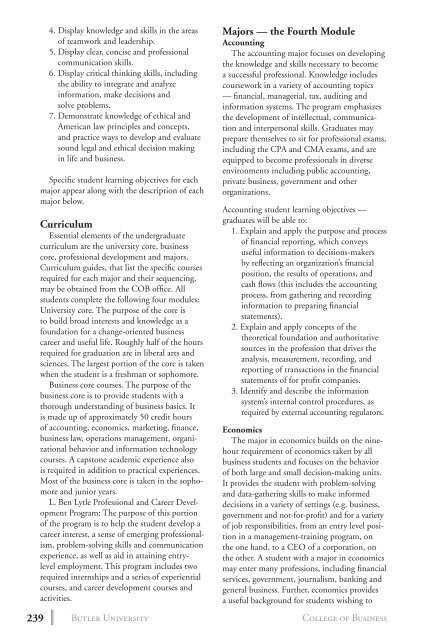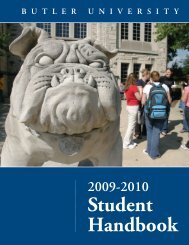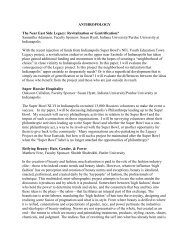2 0 1 3 bulletin - Butler University
2 0 1 3 bulletin - Butler University
2 0 1 3 bulletin - Butler University
You also want an ePaper? Increase the reach of your titles
YUMPU automatically turns print PDFs into web optimized ePapers that Google loves.
4. Display knowledge and skills in the areas<br />
of teamwork and leadership.<br />
5. Display clear, concise and professional<br />
communication skills.<br />
6. Display critical thinking skills, including<br />
the ability to integrate and analyze<br />
information, make decisions and<br />
solve problems.<br />
7. Demonstrate knowledge of ethical and<br />
American law principles and concepts,<br />
and practice ways to develop and evaluate<br />
sound legal and ethical decision making<br />
in life and business.<br />
Specific student learning objectives for each<br />
major appear along with the description of each<br />
major below.<br />
Curriculum<br />
Essential elements of the undergraduate<br />
curriculum are the university core, business<br />
core, professional development and majors.<br />
Curriculum guides, that list the specific courses<br />
required for each major and their sequencing,<br />
may be obtained from the COB office. All<br />
students complete the following four modules:<br />
<strong>University</strong> core. The purpose of the core is<br />
to build broad interests and knowledge as a<br />
foundation for a change-oriented business<br />
career and useful life. Roughly half of the hours<br />
required for graduation are in liberal arts and<br />
sciences. The largest portion of the core is taken<br />
when the student is a freshman or sophomore.<br />
Business core courses. The purpose of the<br />
business core is to provide students with a<br />
thorough understanding of business basics. It<br />
is made up of approximately 50 credit hours<br />
of accounting, economics, marketing, finance,<br />
business law, operations management, organizational<br />
behavior and information technology<br />
courses. A capstone academic experience also<br />
is required in addition to practical experiences.<br />
Most of the business core is taken in the sophomore<br />
and junior years.<br />
L. Ben Lytle Professional and Career Development<br />
Program: The purpose of this portion<br />
of the program is to help the student develop a<br />
career interest, a sense of emerging professionalism,<br />
problem-solving skills and communication<br />
experience, as well as aid in attaining entrylevel<br />
employment. This program includes two<br />
required internships and a series of experiential<br />
courses, and career development courses and<br />
activities.<br />
Majors — the Fourth Module<br />
Accounting<br />
The accounting major focuses on developing<br />
the knowledge and skills necessary to become<br />
a successful professional. Knowledge includes<br />
coursework in a variety of accounting topics<br />
— financial, managerial, tax, auditing and<br />
information systems. The program emphasizes<br />
the development of intellectual, communication<br />
and interpersonal skills. Graduates may<br />
prepare themselves to sit for professional exams,<br />
including the CPA and CMA exams, and are<br />
equipped to become professionals in diverse<br />
environments including public accounting,<br />
private business, government and other<br />
organizations.<br />
Accounting student learning objectives —<br />
graduates will be able to:<br />
1. Explain and apply the purpose and process<br />
of financial reporting, which conveys<br />
useful information to decisions-makers<br />
by reflecting an organization’s financial<br />
position, the results of operations, and<br />
cash flows (this includes the accounting<br />
process, from gathering and recording<br />
information to preparing financial<br />
statements).<br />
2. Explain and apply concepts of the<br />
theoretical foundation and authoritative<br />
sources in the profession that drives the<br />
analysis, measurement, recording, and<br />
reporting of transactions in the financial<br />
statements of for profit companies.<br />
3. Identify and describe the information<br />
system’s internal control procedures, as<br />
required by external accounting regulators.<br />
Economics<br />
The major in economics builds on the ninehour<br />
requirement of economics taken by all<br />
business students and focuses on the behavior<br />
of both large and small decision-making units.<br />
It provides the student with problem-solving<br />
and data-gathering skills to make informed<br />
decisions in a variety of settings (e.g. business,<br />
government and not-for-profit) and for a variety<br />
of job responsibilities, from an entry level position<br />
in a management-training program, on<br />
the one hand, to a CEO of a corporation, on<br />
the other. A student with a major in economics<br />
may enter many professions, including financial<br />
services, government, journalism, banking and<br />
general business. Further, economics provides<br />
a useful background for students wishing to<br />
239 <strong>Butler</strong> <strong>University</strong><br />
College of Business
















